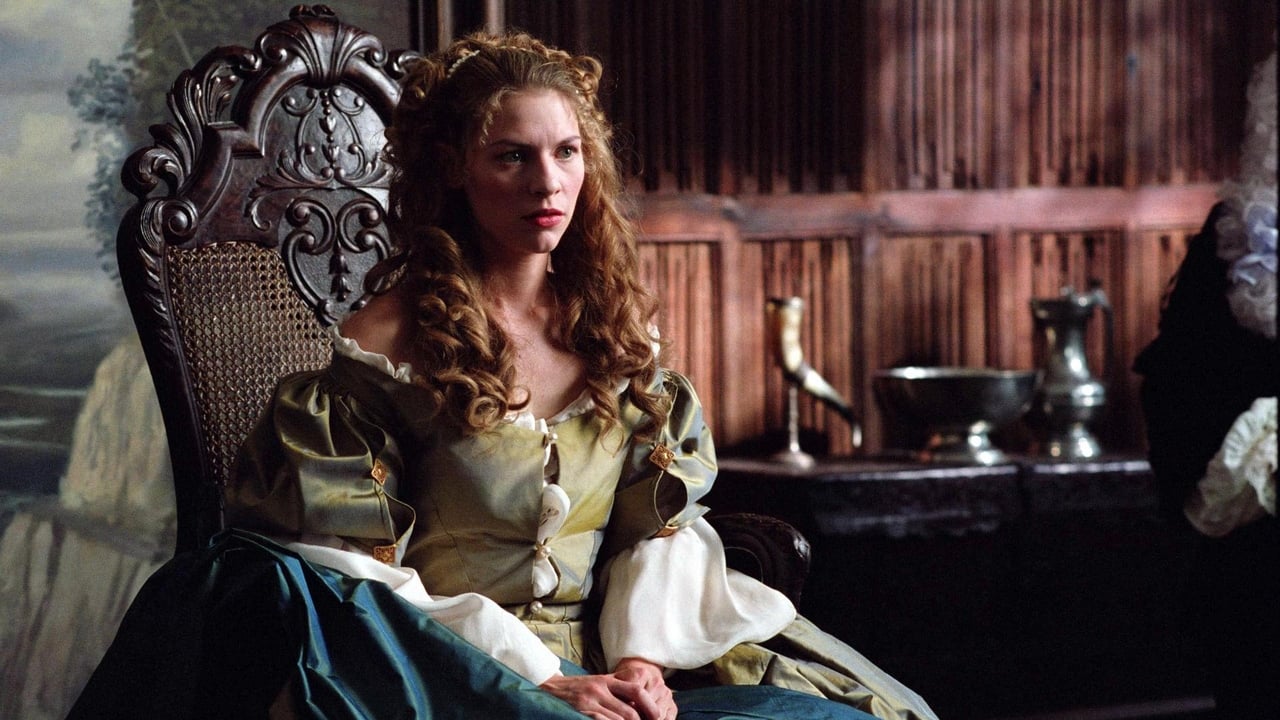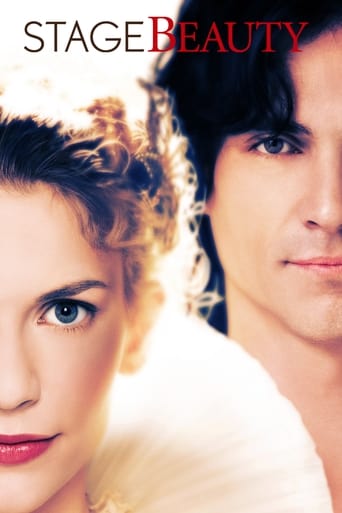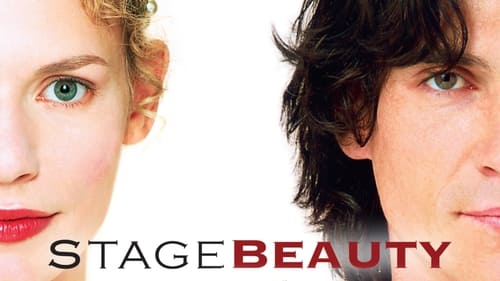



Overrated and overhyped
Highly Overrated But Still Good
Blistering performances.
Close shines in drama with strong language, adult themes.
View MoreAn aspiring actress in Restoration Britain switches dominance with her cross-dressing mentor, but will the switch stick? Good concept with a sound historical basis and the opportunity for clever interplay. The choice of the murder scene in Othello as a plot device makes for comedy in the different styles of performance and delivers a final dramatic rush. And the story moves with pace from playhouse to court, leaving a vague impression of historical London.Biggest problem was with the lead actress, who played a linear part earnestly. Her mentor's story had some twist, which almost came through in his audition before the king, but I was hoping both actors' parts would be mischievous and deceptive, self promoting and self harming. Instead it's all about honest aspiration and just rewards, and misses out the essential weirdness of play acting in a tyranny. But it does come together in the end - a great climax onstage, which had me going with the audience and wondering did they/didn't they? Most awkward performance is in the part of Nell Gwynn - again, on the nose, but I guess that's down to the writing. The king and the company manager are played brilliantly; rest of the cast as good as you'd hope for in a Brit period drama.Music was lush - no historical references, as far as I could tell. Full fathom five.Overall: Entertaining, could have done with more weird.
View MoreStage Beauty (2004) was directed by Richard Eyre. It's set in England in 1660. The monarchy has just been restored, and Charles II is on the throne. (In a clumsy bit of exposition, an actor runs in and says, "The theaters have been closed for 17 years. People want something new!") Of course, what they got is what we now call Restoration comedy. However, they continued to love Shakespeare, and a great Shakespeare performance could still fill theaters.Billy Crudup plays Ned Kynaston, a brilliant male actor who stars in female roles. (We all learned that in Shakespeare's time the female roles were played by men, because women were forbidden to be on the stage. I didn't realize that those laws were still in effect in 1660, but they were.) Ned is really great at what he does. He's been rigidly (cruelly?) schooled to remove every behavior from his repertoire that could be considered masculine. He's a major star. Enter Claire Danes as Maria Hughes, Ned's dresser. She has ambitions to go on the stage as well, and tries to mimic Kynaston's movements and make them her own. She actually performs on an improvised stage in a tavern, and is received very well. She wants to be the first woman to act on the real English stage. As mentioned in the movie, French women had been allowed on the stage by 1660. It's interesting--but not mentioned in the film--that these women were permitted to perform in London. However, they were booed off the stage by the audience. Apparently, the population wasn't quite ready to see women played by women actors. In the film, through a complex interaction at court, involving Nell Gwynn, the king's mistress, women suddenly were allowed to act on the London stage. (Nell Gwynn was indeed the king's mistress, and she was indeed an actor, but not in 1660, when she was only ten years old.)Because of this new ruling, Claire Danes can go on the stage as Desdemona in Othello, and she becomes a star. (A woman did, indeed, play Desdemona in 1660, so that's historically accurate.) Meanwhile, Crudup has been beaten brutally by thugs hired by a vengeful enemy, and he's no longer in demand. So, this is a classic story of theatrical crossed trajectories. (Think about "The Actor.") That's when the movie gets really interesting, and that's where I'll stop talking about the plot.Billy Crudup is superb as Ned Kynaston, Ben Chaplin is excellent as his lover, the Duke of Buckingham, and Hugh Bonneville is wasted in the role of Samuel Pepys, who keeps turning up, but never appears to be in the same film as everyone else.However, the obvious star of Stage Beauty is Claire Danes. Danes was truly charming when she played Juliet at age 17. She was 25 when she acted in this movie, and she got it exactly right. In the film, she's not a very good actor when she starts. It must have been difficult to be a very good actor playing an actor who's not very good. Danes manages it, and more. Crudup's role is more difficult and, to my mind, more central to the film. But what you'll remember is Claire Danes.We saw the film on DVD, and it worked very well. It's an excellent movie, and I highly recommend it.
View MoreI bought this movie because of Billy Crudup. I always enjoy his performances. But, once the movie started, I was mesmerized. The entire mood and theme of the movie; its looks, its pacing and its story, take us to a time that most of us knew little about.Theatre people, and theatre students knew about this and tittered over love scenes between two men. But, nobody thought about the moment when all that was over and women took to the stage. I venture to say most of us didn't know it wasn't more than socially incorrect for women to be in theatre at one time, but illegal.The story is beautifully written and transcends the issue of women versus men on stage and instead focuses on the acting ability of two such people. King Charles II, in the movie, states that the leading lady (Clare Danes) is the first and Crudup is the last (male to play a female, legally...at least in HIS time.) If you want a lovely view of post-Reformation England, theatre in general, you can see it all here. All this movie leaves out is the horrid smells theatre treated you to. It is that real.
View MoreThe early 1660s were a crucial period in the history of the English theatre. The London theatres had all been closed by the Puritans in 1642, and did not reopen until the Restoration of King Charles II in 1660. At this period women were still forbidden from acting on the public stage, so all female parts were played by male actors, just as they had been ever since Shakespeare's day. In about 1662, however, the law was changed to allow women to act in public, and the day of the "boy player" taking female parts was at an end. One of the two main characters in "Stage Beauty" is Edward Kynaston, who was a real-life individual. Kynaston was an actor of the period, who was said to have been a young man of exceptional beauty and was famed for his portrayal of female roles such as Desdemona in Shakespeare's "Othello". The other main character is his stage-struck dresser Maria, who harbours secret ambitions to go on the stage. When the King alters the law, under the influence of his mistress Nell Gwyn who herself has ambitions to become an actress, Maria gets her big chance. Soon, however, a further change in the law forbids men from playing women's parts, and Kynaston finds his livelihood under threat. A further complication is that he and Maria fall in love, even though he has previously been homosexual. This plot involves a few liberties with the historical facts. Kynaston implies that he has been trained all his life to specialise in female parts, rather like the onnagata of classical Japanese theatre, and that he will lose his livelihood if he is forbidden to do this. In fact, Kynaston was born around 1640 and would only have been a young child when the theatres were closed, so would not have received any specialised training in acting. The normal convention in the theatre of the late sixteenth and early seventeenth centuries was that female parts were played by adolescent boys who normally graduated to playing male roles in their late teens. During the period 1660-62 the real Kynaston played both male and female roles, and after 1662 had a long and successful career playing male characters only. He would have been around 20 years old in 1660, much younger than Billy Crudup who was 36 when the film was made. (The film takes a generally cavalier approach to the ages of historical characters: King Charles II, 30 years old at the time of the Restoration, is played by the 45 year old Rupert Everett, and the poet Charles Sedley, only 21 in 1660, is played by the 57 year old Richard Griffith!) There is, of course, a reason for these liberties. The film is ostensibly a light-hearted, bawdy Restoration romp, but it does try to raise some Big Questions, about social class, about the relationship between acting and real life, and about sexuality and gender roles. The main idea it explores (which will be a controversial one in some quarters, particularly among the gay community) is that sexual orientation is not an innate part of one's character but rather a social construct, something forced on one by the culture and conventions of one's society, and because the known facts about the seventeenth-century theatre do not altogether accord with this thesis, they have to be altered to make them fit. The suggestion is that Kynaston's homosexuality is connected with his feminine on-stage persona, that he is essentially acting out a role off-stage as well as on. When a change in the law forces him to act out a male role on-stage, his off-stage personality also changes and he finds himself falling in love with a woman for the first time. I never found this aspect of the film convincing. Much of the reason for this lay with the casting. Claire Danes was rather dull as Maria, and I could never believe in Crudup as Kynaston. He is handsome enough, but in a rugged, masculine way- not the sort of man who could ever convincingly impersonate a woman. The role called not only for a younger actor but also one with a more androgynous, almost feminine beauty. The attempt to explore serious themes was never well integrated with the more comic aspects of the film; "Carry On" type romps are not the best vehicles for an exploration of gender issues. There are certain similarities with "Shakespeare in Love", which dealt with the London theatre of the 1590s and also featured a woman acting on stage, and also with "Singin' in the Rain", which dealt with an equally momentous period in the history of the cinema, the coming of sound. It is not, however, in the same class as either of those films. As a mildly bawdy historical comedy it is amusing enough, but as serious historical, psychological or sociological analysis it never succeeds. 5/10
View More